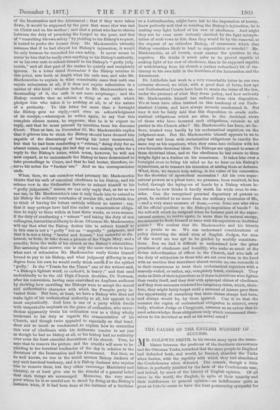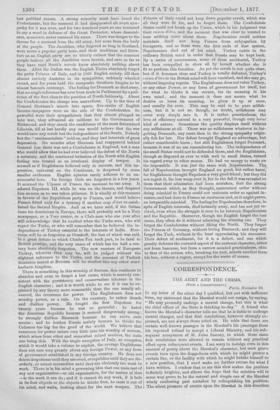THE CAUSES OF THE ENGLISH WORSHIP OF SUCCESS.
MR. GOLDWIN SMITH, in his recent essay upon the resem- blance between the positions of the Southern slaveowners and the Ottoman Turks, remarked that the same people in England had defended both, and would, he fancied, abandon the Turks when beaten, with the rapidity with which they had abandoned the Confederates when defeated. The remark, though a little bitter, is perfectly justified by the facts of the Confederate case, and indeed, by much of the history of English opinion. Of all races in the world, the English, in spite of their tenacity and their indifference to general opinion—an indifference quite as great as Cato'sr--seem to have the least persevering sympathy for lost political causes. A strong minority must have loved the Protectorate, but the moment it had disappeared all overt sym- pathy for it was over, and for two hundred years no one ventured to say a word in defence of the Great Protector, whose descend- ants, moreover, never resumed his name. There was danger to the throne for a moment from the old army, but none from the body of the people. The Jacobites, who lingered so long in Scotland, were never a popular party here, and their traditions and litera- ture as an English party are so utterly extinct that the common people believe all the Jacobites were Scotch, and save so far as they have read Scott's novels know absolutely nothing about them. After the Italian war the English Tories absolutely forgot the petty Princes of Italy, and in 1866 English society, till then almost entirely Austrian in its sympathies, suddenly wheeled round, and for years held the composite Southern Empire to be almost beneath contempt. The feeling for Denmark so died away, that no single reference has ever been made in Parliament by a poli- tician of the first class to the position of North Schleswig. About the Confederates the change was marvellous. Up to the time of General Sherman's march into space, five-sixths of English Income-taxpayers were on the side of the Confederates. So powerful were their sympathisers that they almost plunged us into war, they advanced six millions to the Government of Richmond, and they shook the confidence of the most determined Liberals, till at last hardly any one would believe that the war would have any result but the independence of the South. Nobody but the "sentimentalists " held on, and they had intervals of great depression. Six months after Sherman bad reappeared behind General Lee there was not a Confederate in England, not a man who would allow that he had ever believed the defeat of the North a certainty, and the continued irritation of the North with English feeling was treated as an irrational display of temper. It seemed as if Englishmen believed only in success, and this im- pression, universal on the Continent, is deepened by some smaller evidences. English opinion rarely adheres to an un- successful hero. Its foreign idols are forgotten in a few years. It scorned the Ulysses of France the moment he ran away. It adored Napoleon III. while he was on the throne, and despised him as soon as he was taken prisoner. It is wholly at this moment in favour of the Republican party in France, and would believe France fitted only for a tyranny if another coup d'e'tat re-estab- lished the Second Empire. And as we have said, if the Sultan loses his dominions in Europe, there will probably not be a Tory newspaper, or a Tory orator, or a Club-man who one year after will acknowledge that he exulted when the Turks won, who will regret the Turks, or who will remember that he believed the in- dependence of Turkey essential to the interests of India. Eras- route will be as forgotten as Ocsakoff, the loss of which was said, in a great debate in which Charles Fox took part, to be fatal to British prestige, and the very name of which has for half a cen- tury been absolutely forgotten. The new masters of European Turkey, whoever they may be, will be judged without the slightest reference to the Turks, and the remnant of Turkish dominion seated at Broussa will be studied like any other semi- barbaric kingdom. There is something in this worship of Success, this readiness to abandon and even to forget a lost cause, which is scarcely con- sistent with the persistency and conservatism inherent in the English character ; and it is worth while to see if it can be ex- plained by any theory more reasonable than the one usually ad- vanced, the reverence for power. The Englishman does not worship power, as a rule. On the contrary, he rather dreads and dislikes power. He fought the first Napoleon for twenty years because he was so powerful ; he bated the American Republic because it seemed dangerously strong ; he strongly dislikes Bismarck because he can move such armies ; and he loathes Russia mainly because he thinks the Colossus too big for the good of the world. We believe that reverence for power enters very little into his worship of success, which arises from other and somewhat mixed motives, the main one being this. With the single exception of Italy, an exception which it would take a volume to explain, the average Englishman does not care very greatly about any foreign Power, or any form of government established in any foreign country. He does not detest despotisms until they are cruel, or republics until they are dis- orderly, or mixed monarchies until they are obviously too weak to work. There is in his mind a governing idea that one main test of any new organisation—or old organisation, for the matter of that —is the work it can do ; and if it cannot do any work, if it fails in its first objects or the objects he thinks first, he casts it out of his mind, and waits, looking about for the next weapon, The Princes of Italy could not keep down popular revolt, which was all they were fit for, and he forgot them. The Confederate States could not break up the Union, which in his judgment was their raison d' etre, and the moment that was clear he wanted to hear nothing more about them. Napoleonism could neither maintain itself nor keep France from subjugation by foreigners, and as these were the first ends of that system, Napoleonism died out of his mind. Turkey exists in the ordinary British mind in order that Russia may be kept back. By a series of occurrences, some of them accidental, Turkey has been compelled to show all by herself whether she is fit to perform this function. As yet the result is not quite clear, but if it becomes clear and Turkey is totally defeated, Turkey's raison d'être in the British mind will have vanished, and she may go, without lingering regrets. The Englishman does not value Turkey, or any other Power, or any form of government for itself, but for what be thinks it can secure, for its meaning in his own mind ; and the moment it does not secure what he desires or loses its meaning, he gives it up at once, and usually for ever. This may be said to be pure selfish- ness, but it is not so, though, no doubt, selfishness may enter very deeply into it. It is rather practicalness, the love of efficiency natural to a very powerful, though very borne kind of nature. Sometimes the quality displays itself without any selfishness at all. There was no selfishness whatever in for- getting Denmark, any more than in the strong sympathy origin- ally felt for her. Her defeat brought England no advantage, but rather considerable harm ; but still Englishmen forgot Denmark, because it was of no use remembering her. The independence of the small States could not be defended there, and the Englishman, though as disposed as ever to wish well to small States, turned his regard away to other scenes. He had no energy to waste on the impossible. It was just the same with Napoleonism The fall of Napoleonism brought England no good, but rather harm, for Englishmen thought Napoleon a very good friend ; but they did not regret it, far less weep over it, for in the fall it was revealed to them that their admiration had been mistaken, that the strong Government which, as they thought, maintained order without doing mischief to France could not maintain order as against in- vasion, and had done to France an enormous and, as it might prove, an irreparable mischief. The feeling for Napoleonism therefore, in spite of English interests, died instantly away, and has not yet re- vived, even when the struggle is seen to be between Napoleonism and the Republic. Moreover, though the English forget the lost cause, they often do it without admiring the winning one. They forgot the Confederates without liking the North. They forgot the Princes of Germany, without loving Bismarck, and they will forget the Turk, without in the least appreciating his successor. Their defect of sentiment, for it is a defect, and one which greatly deforms the outward aspect of the national character, arises not from baseness, but from a narrow-minded practicalness, akin to that of the artisan who, breaking his tool, selects another from his box, without a regret, except for the waste of means.







































 Previous page
Previous page